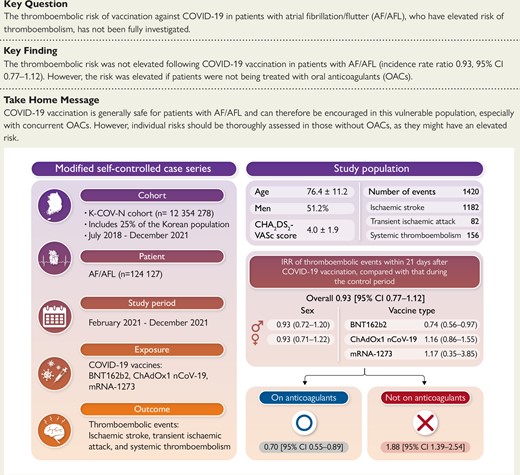-
Views
-
Cite
Cite
You-Jung Choi, Jaehyun Lim, Sungho Bea, Jieun Lee, Jah Yeon Choi, Seung Young Rho, Dae-In Lee, Jin Oh Na, Hyung-Kwan Kim, Thromboembolism after coronavirus disease 2019 vaccination in atrial fibrillation/flutter: a self-controlled case series study, European Heart Journal, Volume 45, Issue 32, 21 August 2024, Pages 2983–2991, https://doi.org/10.1093/eurheartj/ehae335
Close - Share Icon Share
Abstract
Concerns about the safety of coronavirus disease 2019 (COVID-19) vaccines in patients with atrial fibrillation/flutter (AF/AFL) have arisen due to reports of thrombo-embolic events following COVID-19 vaccination in the general population. This study aimed to evaluate the risk of thrombo-embolic events after COVID-19 vaccination in patients with AF/AFL.
This was a modified self-controlled case-series study using a comprehensive nationwide-linked database provided by the National Health Insurance Service in South Korea to calculate incidence rate ratios (IRRs) of thrombo-embolic events. The study population included individuals aged ≥12 years who were either vaccinated (e.g. one or two doses) or unvaccinated during the period from February to December 2021. The primary outcome was a composite of thrombo-embolic events, including ischaemic stroke, transient ischaemic attack, and systemic thromboembolism. The risk period was defined as 0–21 days following COVID-19 vaccination.
The final analysis included 124 127 individuals with AF/AFL. The IRR of thrombo-embolic events within 21 days after COVID-19 vaccination, compared with that during the unexposed control period, was 0.93 [95% confidence interval (CI) 0.77–1.12]. No significant risk variations were noted by sex, age, or vaccine type. However, patients without anticoagulant therapy had an IRR of 1.88 (95% CI 1.39–2.54) following vaccination.
In patients with AF/AFL, COVID-19 vaccination was generally not associated with an increased risk of thrombo-embolic events. However, careful individual risk assessment is required when advising vaccination for those not on oral anticoagulant, as these patients exhibited an increased risk of thrombo-embolic events post-vaccination.

Summary of the study population, methods, and main findings. AF, atrial fibrillation; AFL, atrial flutter; K-COV-N, Korea Disease Control and Prevention Agency–COVID-19–National Health Insurance Service; CI, confidence interval; COVID-19, coronavirus disease 2019; IRR, incidence rate ratio





